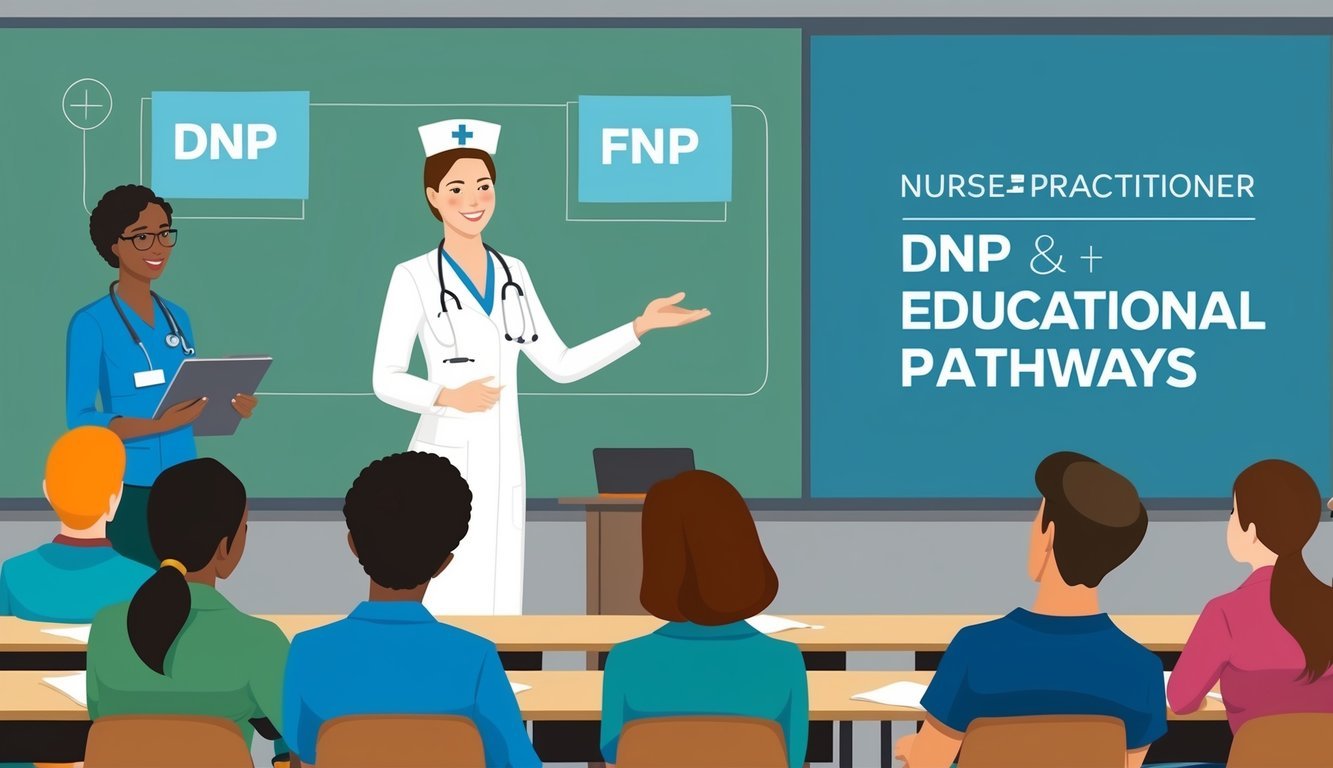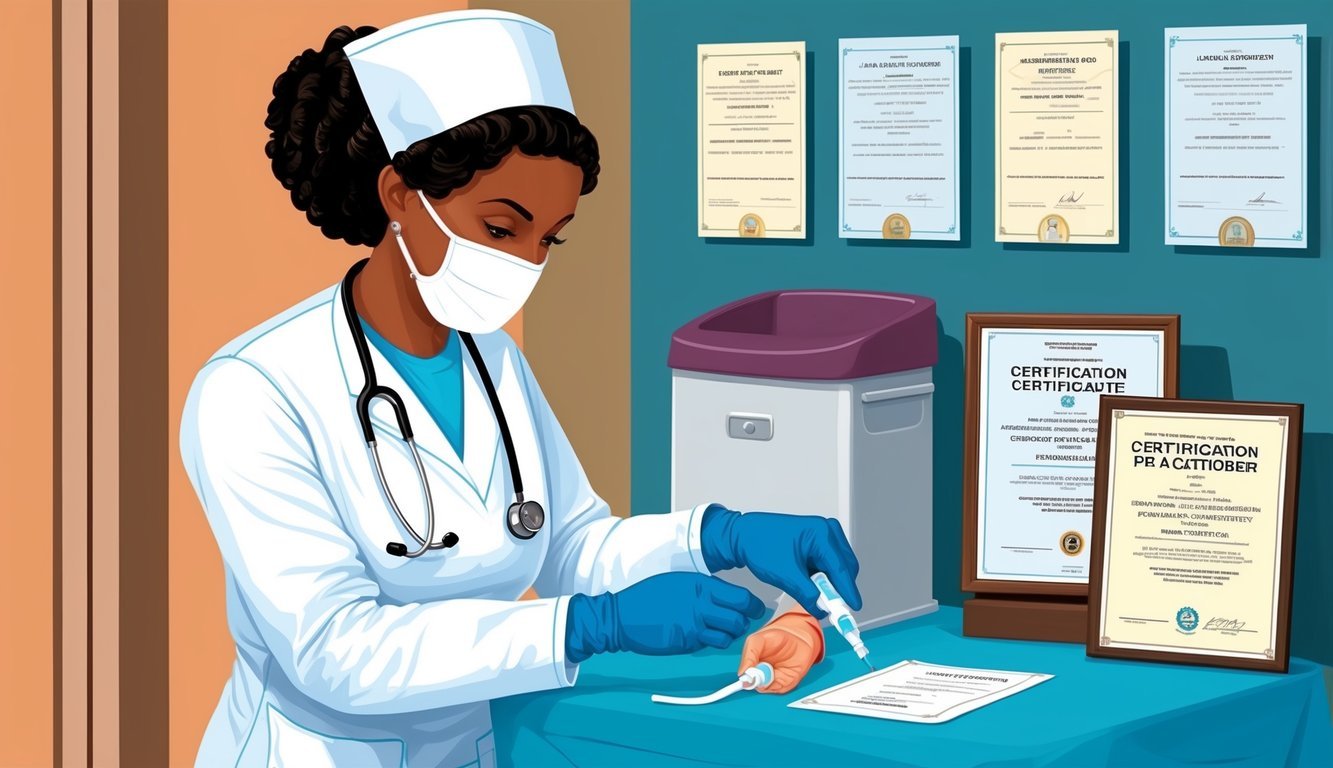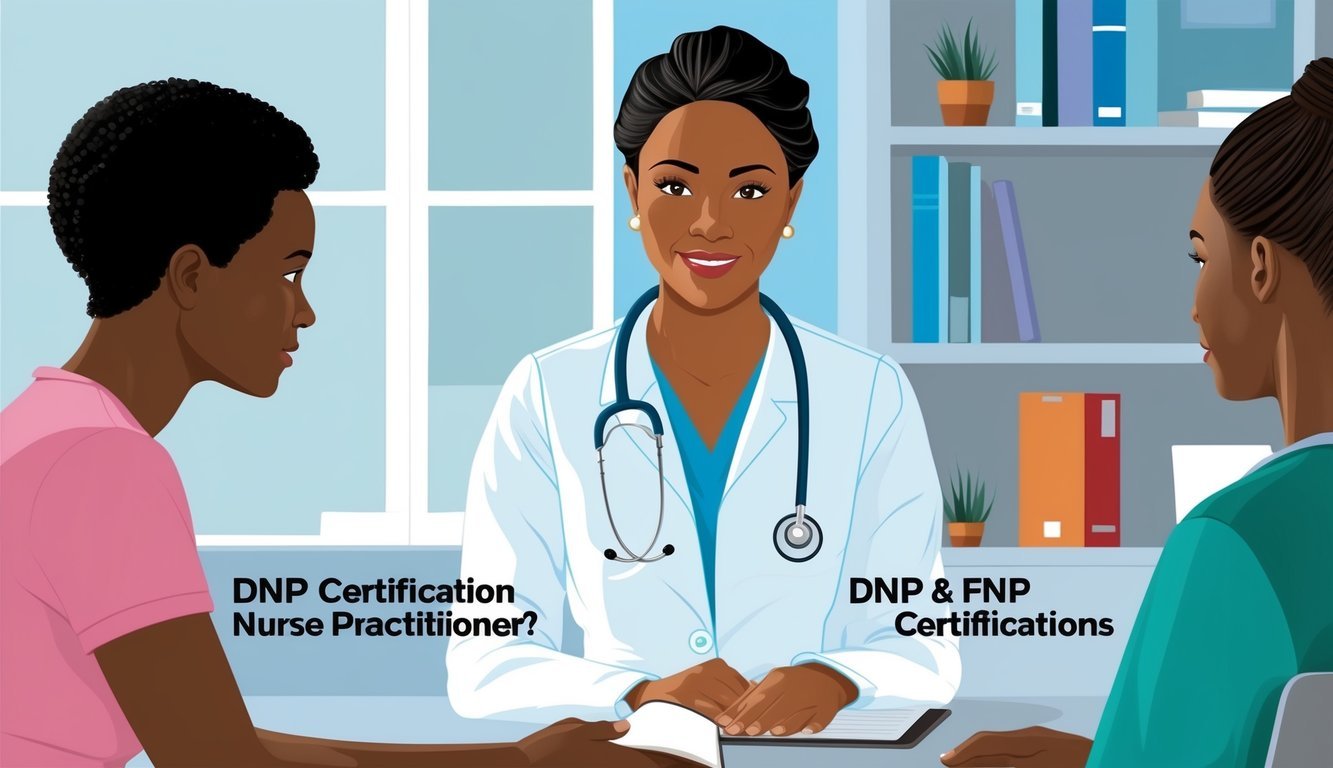When considering advanced nursing roles, you need to understand the differences between a Doctor of Nursing Practice (DNP) and a Family Nurse Practitioner (FNP).
The DNP is a terminal nursing degree that focuses on clinical practice and leadership, while an FNP is a specialized role that provides comprehensive patient care across all ages.
Both paths offer unique opportunities in healthcare but cater to different interests and skills.
Choosing between a DNP and an FNP involves looking at your career goals.
If you desire to influence healthcare systems and take on leadership roles, the DNP may be the right choice.
On the other hand, if you want to work directly with patients and provide family-centered care, becoming an FNP could suit you better.
Exploring these options can help you make an informed decision that aligns with your aspirations.
It’s important to weigh the educational pathways, certification processes, and career prospects for each role as you navigate your nursing career.
Knowing the critical details about DNP and FNP positions can guide you in choosing the best path to success in nursing practice.
Key Takeaways
- DNP focuses on leadership and system improvements in healthcare.
- FNPs provide comprehensive care to patients of all ages.
- Understanding each role helps in making informed career decisions.
Overview of DNP and FNP Roles
The Doctor of Nursing Practice (DNP) and Family Nurse Practitioner (FNP) roles are key positions in nursing.
Each has unique responsibilities and focuses on different areas of patient care and nursing practice.
DNP: Scope and Responsibilities
As a DNP, you engage in high-level nursing practice.
Your focus includes leadership, policy-making, and transforming health care systems.
This role requires a deep understanding of research and its application in clinical settings.
A DNP prepares you for roles like Nursing Director or Chief Nursing Officer.
Your responsibilities can range from developing healthcare policies to overseeing patient safety initiatives.
A DNP program typically includes clinical practice hours and a capstone project.
This project applies research findings to improve patient care.
FNP: Core Competencies
As an FNP, your primary responsibility is providing comprehensive health care to families.
This includes diagnosing illnesses, developing treatment plans, and educating patients about their health.
You work in various settings, such as clinics and private practices, focusing on primary care.
Your training emphasizes clinical skills and direct patient interaction.
FNPs complete a Master of Science in Nursing (MSN) or a DNP program and must pass a national certification exam.
You are equipped to manage chronic conditions, perform physical examinations, and prescribe medications.
The focus is always on improving patient outcomes and promoting wellness in families.
For further information, you might visit resources like NurseJournal for insights on nursing roles.
Educational Pathways

When pursuing a career in nursing at a higher level, understanding the differences in educational pathways for a Doctor of Nursing Practice (DNP) and a Family Nurse Practitioner (FNP) is vital.
Both paths have unique requirements.
Academic Requirements for DNPs
To earn a DNP degree, you typically need a Master of Science in Nursing (MSN) or a nursing degree at a higher level.
Your coursework will focus on advanced nursing theory, clinical practice, and healthcare leadership.
DNP programs emphasize research application and policies in a clinical setting.
As a student, you will explore topics such as evidence-based practice and healthcare systems management.
Most DNP programs are designed for registered nurses (RNs) who want a terminal degree in nursing, allowing for roles in administration, education, or advanced practice.
You may enter an RN-to-DNP program if you hold only a bachelor’s degree.
Academic Requirements for FNPs
To become an FNP, you must complete an accredited nursing program and earn a Master of Science in Nursing (MSN).
Your education will focus on family-focused care and primary healthcare concepts.
Courses may include advanced health assessments, pathophysiology, and pharmacology.
After completion, you will sit for the FNP certification exam to practice as an Advanced Practice Registered Nurse (APRN).
Most FNP programs also require clinical rotations, providing hands-on experience in patient care.
This ensures you are well-prepared for managing health concerns across various age groups.
MSN to DNP Transition
If you already have an MSN, transitioning to a DNP program can be a strategic move.
Many universities offer RN-to-DNP or post-master’s certificate options that build on your existing knowledge.
These programs typically include fewer core nursing courses, allowing you to focus more on advanced clinical practice and leadership.
You will enhance your understanding of healthcare improvements and develop skills to influence policy.
Consider programs with flexible schedules and online options, as these can fit into your busy life.
This transition can open doors to higher-level roles within healthcare settings, enhancing your career prospects.
For more information about DNP education pathways and programs, check out NurseJournal and other nursing education resources.
Certification and Clinical Practice

Understanding certification and clinical practice is essential for anyone considering a path as a Family Nurse Practitioner (FNP) or a Doctor of Nursing Practice (DNP).
Both roles require specific certifications and clinical training to ensure the highest standard of care.
Certification Process for FNPs and DNPs
The certification process varies significantly between FNPs and DNPs.
FNPs must obtain board certification from recognized organizations such as the American Nurses Credentialing Center (ANCC) or the American Association of Nurse Practitioners (AANP).
This typically involves passing a comprehensive exam after completing accredited graduate-level programs.
DNPs, on the other hand, often hold a terminal degree in nursing and may choose to pursue additional certifications relevant to their specialty.
For example, they often focus on leadership roles in nursing administration or clinical practice settings.
While certification for DNPs is not always mandatory, it can enhance your credentials and career opportunities.
Clinical Training and Hours
Clinical training is a critical component of both FNP and DNP programs.
As an FNP, you are required to complete a specific number of clinical hours, usually around 500-1,000, which can include direct patient care and supervised clinical experiences.
In comparison, DNP programs often require even more extensive clinical training.
This includes not only patient care hours but also opportunities to engage in health policy and nursing administration scenarios.
Continuing education is vital for both roles to maintain certification and stay updated on best practices in clinical care.
The depth of your clinical experience can significantly impact your effectiveness in practice, bridging the gap between theoretical knowledge and real-world application in patient care settings.
Roles in Healthcare Systems
In healthcare systems, both Doctor of Nursing Practice (DNP) and Family Nurse Practitioner (FNP) roles are critical.
They shape how care is delivered, influence policy, and lead within their organizations.
Understanding these roles gives you insight into their impact on patient care and system efficiency.
Leadership and Administration
DNPs often take on leadership roles in healthcare settings.
They are equipped to manage teams and guide nursing practices.
Their education prepares them for roles like nurse anesthetist or chief nursing officer, where clinical expertise meets administrative skills.
In these positions, DNPs focus on improving patient outcomes and optimizing healthcare delivery.
They analyze data to make informed decisions, address staffing needs, and implement evidence-based practices.
Key Duties:
- Overseeing nursing staff
- Managing budgets
- Evaluating care practices
FNPs, while primarily focused on direct patient care, also play a role in leadership.
They may lead small teams and drive initiatives that enhance care quality in their practice environments.
Providing Comprehensive Care
FNPs deliver primary care to patients across all ages.
They assess, diagnose, and manage various health conditions.
Their focus is on patient-centered care, which promotes long-term health through preventive measures and education.
In addition to routine examinations, FNPs provide chronic disease management and health counseling.
They are typically the first point of contact for patients, ensuring that care is continuous and holistic.
Common Services:
- Health screenings
- Immunizations
- Chronic disease management
DNPs also contribute to patient care but with a broader scope that includes policy development and practice improvement.
They may conduct research to identify best practices that can be applied at various levels of care.
Influence on Policy and Healthcare Trends
DNPs play a vital role in shaping healthcare policy.
Their advanced education enables them to influence legislation related to nursing practices and patient safety measures.
They advocate for better health policies that address systemic issues.
Through research and leadership, DNPs can drive changes that enhance care delivery and access.
For example, they may lead initiatives that aim to expand the roles of advanced practice nurses in underserved areas.
Career Outlook and Advancement

The career outlook for both Doctor of Nursing Practice (DNP) and Family Nurse Practitioner (FNP) roles is promising.
As healthcare needs expand, the demand for advanced practice nursing continues to grow.
Understanding job opportunities, salary comparisons, and pathways for professional development can help guide your career choices.
Employment Opportunities and Job Growth
The job market for nurse practitioners is rapidly expanding.
The Bureau of Labor Statistics projects a growth rate of 52% for nurse practitioners between 2020 and 2030.
This surge reflects the increasing need for healthcare providers, particularly in primary care settings.
In states with full practice authority, you might find even more opportunities.
For instance, Alaska expects an 8.57% growth in nurse practitioner roles by 2028.
This trend highlights the demand for skilled professionals in diverse healthcare environments, including hospitals, private practices, and community clinics.
Salary Comparisons
Salaries for DNPs and FNPs can vary significantly based on factors like location and specialization.
According to recent data:
| Role | Average Salary Range |
|---|---|
| DNP | $110,912 – $129,480 |
| FNP | $103,885 – $157,928 |
DNPs often have higher earning potential due to their advanced training and roles in leadership or specialized fields.
For example, nurse anesthetists, a role often pursued by DNP graduates, can earn a median salary of $195,610.
Comparative salary data helps you weigh your options when considering advancement to a DNP program.
Continued Professional Development
To advance your career, ongoing education and skills development are essential.
As a DNP, you can take on leadership roles, shaping policies and improving healthcare systems.
Many DNP programs include courses in leadership, quality improvement, and healthcare policy, equipping you with the tools needed for such positions.
Engaging in certifications and attending workshops can further enhance your qualifications.
You might also consider joining professional organizations that offer networking opportunities and resources for continued learning.
This proactive approach can significantly impact your career trajectory and job satisfaction.
Frequently Asked Questions

This section addresses common questions about the differences and similarities between DNP and FNP programs.
You will find specific information on salary expectations, educational scope, costs, title usage in clinical settings, and program duration.
What are the differences in salary between DNP and FNP educated nurses?
DNP-educated nurses often earn higher salaries than FNPs.
According to data, DNP graduates can earn a median salary of around $195,610, especially in roles such as nurse anesthetists.
In contrast, FNPs typically have a lower salary range, but still earn a competitive income within the nursing field.
What distinguishes DNP from FNP in terms of educational scope and practice?
The DNP program emphasizes advanced clinical practice, leadership, and health policy, while the FNP program focuses on clinical skills necessary for providing direct patient care.
DNP graduates often take on roles in healthcare administration or policy, whereas FNPs primarily work in clinical settings providing patient care.
What are the comparative costs of pursuing a DNP versus an FNP?
The cost of pursuing a DNP degree can be higher than that of an FNP due to the extended duration and advanced curriculum.
Tuition for DNP programs can range from $20,000 to $50,000, depending on the institution.
FNP programs often range from $15,000 to $30,000, making them generally more affordable.
Can individuals with a DNP degree use the title ‘doctor’ in a clinical setting?
Yes, individuals with a DNP degree can use the title “doctor” in a clinical setting.
However, it is important to clarify that this title refers to their academic qualifications and not to a medical doctor (MD) status.
Clear communication with patients about this distinction is essential.
How does the earning potential compare between DNP-educated nurses and NPs?
DNP-educated nurses typically have higher earning potential compared to NPs with only a master’s degree.
Factors such as experience, geographic location, and specific job roles play significant roles in determining salary.
DNP graduates often qualify for leadership positions that command higher wages.
What is the typical duration for completing a DNP program following an FNP?
Completing a DNP program after obtaining an FNP typically takes between 1 to 3 years.
The duration depends on whether you study full-time or part-time.
If you already hold an FNP certification, many programs allow for a more streamlined path, reducing the overall duration.

